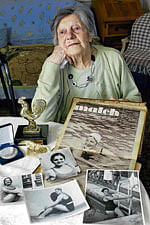
Three quarters of a century on, Therese Blondeau recalls perfectly Adolf Hitler by the side of a pool watching the French swimmers train before the 1936 Berlin Olympics.
"He came almost every day, in his uniform and surrounded by his bodyguards," said 97-year-old Blondeau, believed to be the the last female survivor among the 203 French athletes from the 1936 Games, the most politicised in the history of the Olympics.
In the previous year, France had beaten Germany at swimming and Therese, in the backstroke, and her sister Renee, in the freestyle, had contributed significantly to the French success. "He moved into the gallery and spent a long time assessing us, to see our fitness and whether we would beat the Germans. It was real spying but it didn't really bother me."
Having also competed in Mussolini's Italy, Blondeau is able to offer a comparision of the two dictators. "Hitler was a fighter who wanted to have everything, win everything. Mussolini swaggered more," she said.
After holding power for three years, Hitler wanted to make the 1936 Games a symbol of the superiority of the Aryan race and Nazism. Awarded in 1931 to the capital of what was then a democratic country, the Games were instead held under dictatorship from Aug 1-16 1936.
Germany, with the biggest number of athletes (348), won a record 89 medals, surpassing even the United States with 56.
Still alert despite her advanced age, Blondeau chatted about the Games with dozens of photographs and the official album published by the organisers in front of her on the table in her apartment in the Paris suburbs. "Prior to Berlin, there were the European Championships in Magdeburg, and you already sensed a melancholy, a threat which then became real," she said.
"At the Games, we felt the tension. Before the opening ceremony, we had to repeat the Olympic salute several times. There is no confusion with the Hitler salute."
However, the Games' salute, inspired by Ancient Rome and phased out in the second half of the 20th century, resembled the salute of fascist Italy. "The salute was misinterpreted by the crowd, which exploded into applause. It was very embarrassing," Blondeau said.
Favourite in the 100 metres backstroke, Blondeau was not at her best in Berlin, having lost her father suddenly just a few weeks before the Games. She was eliminated in the heats, despite establishing the fourth fastest qualifying time, so took instead the opportunity to discover a little of Hitler's Berlin. The French swimmer also remembers the camaraderie which prevailed among the athletes in Berlin, whatever their nationality and their skin colour. "We were good friends, there was a lot of affection," she said.
Towards the end of the Games, Blondeau was invited with other French athletes to a reception hosted by the Fuehrer, but she refused to go. "We had to meet for an athletes' farewell party, and there was no question I was missing that."
Blondeau continues to follow major sporting events passionately on television, with a preference for swimming but including athletics and tennis. She is amused by the recent controversy over swimmers wearing now-banned polyurethane costumes to boost speed. She swam in a bathing suit made of wool and had to give back her official uniform after the Games.
"We bought our own costumes for us to go training in pools where the water in summer rarely exceeded 16 degrees."
When asked who in her view was the best swimmer of all time, the answer came without hesitation: "Johnny Weissmuller, of course!"
The future Tarzan was the first swimmer to dip under a minute in the 100 freestyle and won five medals in two Olympics in the 1920s. "He was friendly, very normal and, above all, a beautiful boy," Blondeau said, smiling.